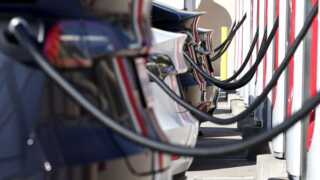Share via: NITI Aayog has called for stricter regulations to mandate EV adoption across public fleets and the electrification of 100 per cent urban transport in five pilot cities in India. …Read More NITI Aayog has called for stricter regulations to mandate EV adoption across public fleets and the electrification of 100 per cent urban transport in five pilot cities in India. (Getty Images via AFP) Get Launch Updates on Notify me Adoption of electric vehicles in India has been increasing, but the pace is slower than what is in some of the leading markets like the US, EU and China. In India, electric vehicles made up only 7.6 per cent of the country’s total vehicle sales in 2024, which put the pace of growth well short of the 30 per cent goal the country is aiming to achieve by 2030. While there has been notable progress in electric two-wheelers and three-wheelers, penetration of EVs in buses, cars and long-haul truck segments remains sluggish. To emphasise these untapped segments, India needs a national EV policy, believes NITI Aayog. A report by the think tank, titled “Electric Vehicles in India: Unlocking a USD 200 Billion Opportunity,” has outlined an ambitious roadmap to boost the adoption of electric vehicles in the country. The report identifies key challenges and proposes bold mandates to achieve the target of 30 per cent EV sales by 2030. It also proposed strategic investments and regulatory reforms to accelerate the transition. India is far behind its peers in EV transitionThe report states that India’s EV sales grew from just 50,000 units in 2016 to over 28 lakh units in 2024, as against global EV sales having risen from 918,000 units in 2016 to 18.78 million units in 2024. India has progressed to only about 7.6 per cent of the sales in 2024 being electric, which is far behind its target of 30 per cent by 2030. The report also noted that India has taken nearly 10 years to reach a penetration level of 7.6 per cent and now needs to increase this share by over 22 per cent in the next five years alone. “India is doing well with electric two-wheelers and electric three-wheelers. With regard to electric buses, it has made some progress, but with electric cars, it has been slow. Long-haul electric trucks have virtually not taken off,” it further added. India’s EV transition: Way forwardThe report outlines multiple policy shifts and calls for a transition from incentives to mandates for zero-emission vehicle (ZEV) adoption. The report focused on the electrification of urban fleets of buses, para-transit, and freight vehicles in five cities to create a demonstrable impact. The report has proposed the establishment of a pooled fund with multilateral support to reduce capital cost barriers for electric buses and electric trucks. Also, the development of a robust EV charging infrastructure along 20 high-density freight corridors, as well as a nationwide unified EV charging app for ease of access and payment, are among the proposals mentioned in the report. NITI Aayog has proposed a progressive plan that includes disincentives for internal combustion engine (ICE) vehicles, tighter Corporate Average Fuel Efficiency (CAFE) norms, and regulatory support for battery leasing and EV power lines (EVPL). A special focus is placed on enabling small operators, who form the majority of bus and truck owners in India, through priority sector lending and risk-mitigation mechanisms. The report notes that India’s vehicular landscape is dominated by two-wheelers and small fleet owners, unlike Western countries, where private cars are the norm. The need for shorter travel distances and lower-cost mobility solutions makes India’s EV trajectory distinct, warranting a saturation-based approach rather than nationwide distribution, stated the report. It said that while India fares reasonably well in charger availability, one charger for 14 electric cars, utilisation of those remains low due to poor location planning, land access issues, and lack of consumer awareness. To overcome this challenge, the report has recommended setting up a nodal agency in each state of the country, in order to streamline charging infrastructure rollouts. NITI Aayog calls for a national EV transition policyThe report emphasised an immediate action plan to kickstart the EV transition momentum. NITI Aayog has recommended that there should be a national EV transition policy with clear timelines. Stricter regulations to mandate EV adoption across public fleets and the electrification of 100 per cent urban transport in five pilot cities have been proposed. It also stated that there is a need to operationalise a blended finance fund for affordable EV loans and form an inter-ministerial task force to resolve regulatory bottlenecks. Check out Upcoming EV Bikes in India. First Published Date: 05 Aug 2025, 10:32 am IST
Source: hindustantimes.com






